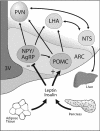Hypothalamic leptin regulation of energy homeostasis and glucose metabolism
- PMID: 17584844
- PMCID: PMC2277030
- DOI: 10.1113/jphysiol.2007.135590
Hypothalamic leptin regulation of energy homeostasis and glucose metabolism
Abstract
Growing evidence suggests that food intake, energy expenditure and endogenous glucose production are regulated by hypothalamic areas that respond to a variety of peripheral signals. Therefore, in response to a reduction in energy stores or circulating nutrients, the brain initiates responses in order to promote positive energy balance to restore and maintain energy and glucose homeostasis. In contrast, in times of nutrient abundance and excess energy storage, key hypothalamic areas activate responses to promote negative energy balance (i.e. reduced food intake and increased energy expenditure) and decreased nutrient availability (reduced endogenous glucose production). Accordingly, impaired responses or 'resistance' to afferent input from these hormonal or nutrient-related signals would be predicted to favour weight gain and insulin resistance and may contribute to the development of obesity and type 2 diabetes.
Figures



Comment in
-
Obesity and the central nervous system.J Physiol. 2007 Sep 1;583(Pt 2):423. doi: 10.1113/jphysiol.2007.140566. J Physiol. 2007. PMID: 17766646 Free PMC article. No abstract available.
References
-
- Anand BK, Brobeck JR. Localization of a ‘feeding centre’ in the hypothalamus of the rat. Procedings Soc for Exp Biol Med. 1951;77:323–324. - PubMed
-
- Baskin DG, Breininger JF, Schwartz MW. Leptin receptor mRNA identifies a subpopulation of neuropeptide Y neurons activated by fasting in rat hypothalamus. Diabetes. 1999;48:828–833. - PubMed
Publication types
MeSH terms
Substances
LinkOut - more resources
Full Text Sources

